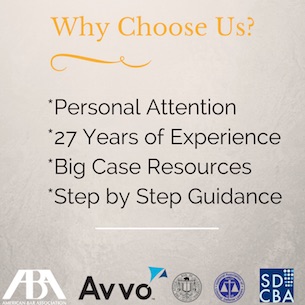San Diego Felony Defense Attorney
What Is The Difference Between A Felony And A Misdemeanor?
A felony is any crime punishable by death or imprisonment in state prison. Other crimes are treated as misdemeanors, carrying a maximum of one year in county jail. Most felony convictions also result in collateral consequences, such as the loss of professional licenses, loss of firearm ownership, and job loss. Certain California felonies must be served in county jail if required by the new sentencing program, the Criminal Justice Realignment Act of 2011.
(619) 615-4216
California Felony Offenses
While most felonies involve violence, you can be charged with a felony even if you committed a nonviolent crime. If you have prior convictions, even a nonviolent offense can be elevated to a felony, when it otherwise would have been charged as a misdemeanor.
Some of the most common California felonies include:
White Collar Crimes – Bribery, Forgery, Fraud, Embezzlement
Drug Crimes – Manufacturing, Possession, Distribution, Sales
Sex Crimes – Sexual Abuse, Sexual Assault, Possession of Child Porn
Violent Crimes – Kidnapping, Arson, Manslaughter, Murder
Theft Crimes – Burglary, Armed Robbery, Carjacking, Grand Theft
How The Three Strikes Law Influences Sentencing
While felony convictions can result in harsh penalties anywhere, California’s three strikes law can make a conviction particularly devastating. The three strikes law is harsh, tough-on-crime legislation that increases punishment for repeat offenders. This law requires that repeat felony offenders serve increasingly severe sentences with every subsequent offense. Under this legislation, someone convicted of their third serious or violent felony automatically faces 25 years to life.
If you already have one strike on your record and you’re convicted of a second serious felony, you’ll automatically face a doubled prison sentence with triple the amount of time in actual custody – due to the law’s reduction of good behavior credit. With two strikes on your record, if you’re convicted of a third strike offense or other qualifying felonies, you’ll automatically be required to serve 25 years to life in prison.
There are ways to fight a three strikes conviction. It’s possible to negotiate a plea bargain with the prosecutor or judge to cancel a strike. Your attorney may conduct legal research on prior strike convictions to determine if there’s a basis for attacking their validity. Another possibility is to prepare a Statement in Mitigation – presenting information about any mitigating factors, and arguing for a reduced sentence. Your attorney may file a Romero Motion to request that the sentencing judge cancel a prior strike conviction. This motion asks the court to reexamine earlier cases, in order to reconsider an earlier crime in light of how you’ve reformed since the crime took place.
Determinate & Indeterminate Sentencing
If you’ve been convicted of a felony in the state of California, you could face either a determinate or indeterminate sentence. A determinate sentence is a jail or prison term with a defined length that can’t be changed by a parole board or other agency. The sentence imposed by the judge, minus credits accumulated while in prison, is the sentence the offender actually serves – the parole board can’t let him out early. An indeterminate sentence, on the other hand, consists of a range of years. There’s always a minimum term, but the release date – if any – is uncertain, and will be determined by a parole board when it periodically reviews the case. The sentence actually served can vary widely from one offender to the next for the same crime.
Most felonies are punishable under the determinate sentencing laws – meaning that the judge can impose one of three prison terms: a low, middle, or high term of imprisonment. The judge typically chooses a middle-of-the-road sentence, though their decision will be impacted by several different factors: their own discretion, the seriousness of the crime, and the defendant’s criminal record. Indeterminate sentencing is generally reserved for particularly egregious felonies like murder, kidnapping, and rape.
Why Are Some California Crimes Known As Wobblers?
California has over one hundred different crimes that can be charged as either a felony or a misdemeanor. These are known as “wobblers,” and how they are charged depends on the specific facts of the case, and your criminal history. There is typically some aggravating circumstance involved to elevate the charge from a misdemeanor to a felony. If the facts of your case are severe, or if you have a criminal history that justifies a harsh sentence, prosecutors will likely charge you with a felony. Otherwise, you may only be facing a misdemeanor. The seriousness of the crime, injuries to the victim, and the defendant’s prior record are all contributing factors to determine the charges filed. Some of the most common wobblers in California include assault, domestic violence, vandalism, and sexual battery.
Don’t Let A Felony Conviction Jeopardize Your Future
If you have been charged with a felony offense in California, it’s important to understand what you’re up against. At best, you might receive formal probation with little or no jail time, but in the worst case scenario, the consequences could include a lifetime behind bars in state prison. Even if you face the lightest possible sentence for a felony conviction, the permanent mark on your criminal record can have severe consequences. Since background checks have become the norm for most businesses, your prospective employer might deny your application due solely to your criminal conviction. A felony conviction can sometimes result in a denial of credit, since mortgage and credit card lenders frequently conduct background checks. Your ability to pursue opportunities for higher education could also be limited, since a university may deny admission based on the results of a criminal background check. Some regulatory agencies won’t grant you a license or permit if you have a felony conviction.
Serious Charges Demand A Serious Defense
Don’t delay in seeking representation to minimize the impact of the charges you face. As a former prosecutor and law enforcement officer, attorney Gregory Garrison is uniquely qualified to achieve the best possible outcome for your case. When representing you, we will stand by you through every step of the process, thoroughly review the evidence against you, and do everything possible to secure a favorable resolution on your behalf.
The Law Office of Gregory Garrison has been defending the rights of the criminally accused for many years. Rest easy knowing that we are backed by both client satisfaction and a proven record of success. Contact us today for a free evaluation, and let us put our combined legal experience to work for you!


